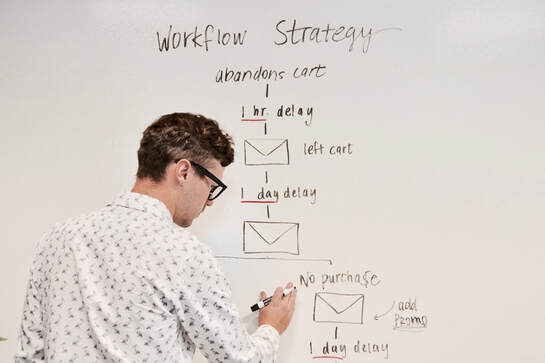1. Comprehensive Task Management - At the core of efficient workflows lies the ability to manage tasks comprehensively. It’s important to categorise, prioritise and delegate tasks to ensure that each element of your business workflows (from customer service, to marketing, to bookkeeping) aligns with the overarching goals of the business. By implementing task management tools and techniques (like those mentioned in the paragraph below) you can create a structured environment where team members clearly understand their responsibilities and deadlines, and can successfully work towards them.
2. Collaborative Project Management - Effective project management is essential for successful workflows. There are a number of collaborative project management tools out there that allow you to assign tasks, set deadlines, and track progress. These platforms facilitate transparency, allowing team members to stay informed about the status of projects and ensuring that everyone is aligned with the overarching objectives. Tools like Slack, Asana, Todoist, and Monday can be really helpful when it comes to managing projects and being able to quickly and easily see (and understand!) where a project is at the moment, and where it falls in your current pipeline of work.
3. Documenting Processes and Procedures - Documenting processes and procedures is a fundamental strategy to help ensure consistency and clarity in workflows. By creating detailed manuals, guides, and documentation for various tasks, you can provide a reference point for team members - both permanent and temporary, contracted workers. This not only streamlines training processes for new team members but also ensures that established workflows can be replicated consistently.
4. Continuous Process Improvement - Be a champion of continuous process improvement! It’s so important to understand that regular evaluation and carefully consideration of the way that you work (and why you are working that way) is key to business success. Technology, attitudes towards products/services, changing working habits - there are a huge number of things that can impact the success of the work that we are doing, and things can change in an instant. Just because something worked once, it doesn’t mean that it still works just as effectively today! It’s important to be open to the idea of change and trial new ways of working, if required.
By regularly evaluating workflows, identifying bottlenecks, and seeking ways to enhance efficiency, we can all work more productively in our businesses.
So why not think about some of your systems and processes today - what could you do differently this new year to refine the way that you work?


 RSS Feed
RSS Feed
